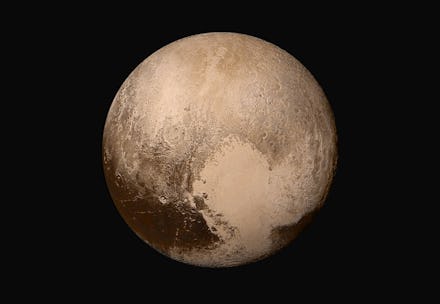The Latest Data on Pluto Shows It's More Planet-Like Than We Thought

Pluto is one mysterious, confusing world, and the more we learn about it, the less astronomers know how to classify it.
In 2006, the International Astronomical Unit downsized Pluto from a planet to a dwarf planet. It makes sense when you compare its size to the other known dwarf planets in our solar system:
People cried, got angry and even protested, but eventually we all (sort of) got over it. That is, until NASA sent a space probe past Pluto in 2015 and beamed back a treasure trove of data. According to some, that data has reopened the debate over Pluto's classification and even the way we classify other celestial objects.
A new study shows that Pluto's atmosphere doesn't interact with solar wind the way that it should. Solar wind is made of streams of charged particles that spill off the sun and blow through space at up to 100 million miles per hour. When solar winds hit something smaller like a comet, there's a gentle decrease in speed. When it hits a planet, it's more like an abrupt halt and the wind gets diverted.
Scientists expected Pluto to interact with solar wind in the same way that comets do. However, it turns out Pluto is a little more planet-like than we thought. It actually interacts with solar wind like something in between a comet and a planet, suggesting we may need an entirely new way to classify Pluto.
"This is a type of interaction we've never seen before anywhere in our solar system," David McComas, lead author of the study, said. "The results are astonishing."
Not everyone agrees though.
Astrophysicist Neil deGrasse Tyson tweeted that considering Pluto's other characteristics, the solar wind data isn't so surprising:
It seems we still need more data and more exploration before astronomers consider an overhaul to their classification system.
"These results speak to the power of exploration," New Horizons principle investigator Alan Stern said in a statement. "Once again we've gone to a new kind of place and found ourselves discovering entirely new kinds of expressions in nature."
h/t Universe Today